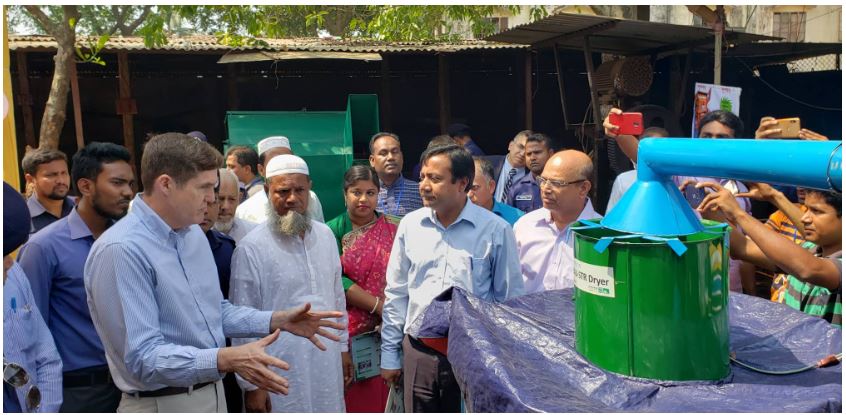Latest News and Announcements
PHLIL's Technological Innovations to Reduce Food Loss and Waste: Insights from USAID AOR Ahmed Kablan on Agrilinks (December 2022)
PHLIL's USAID AOR Ahmed Kablan highlighted PHLIL technologies in a recent Agrilinks blog on food loss and waste, saying that, "The bottom line is that FLW-reducing technologies and innovations can have huge positive impacts on economies, poverty and hunger and diet quality." Read more here.
PHLIL's Impact in Ghana: Empowering Women in Poultry to Reduce Post-Harvest Loss and Enhance Food Security (December 2022)
Post-harvest loss of maize due to insect damage and aflatoxin contamination is a major challenge for poultry producers in Ghana. PHLIL has worked with the Women's Poultry Association and other smallholder poultry farmers in Ghana's Middle Belt and northern regions to make two critical PHLIL technologies available - the GrainMate Moisture Meter by Sesi Technologies and ZeroFly hermetic storage bags from Vestergaard - that reduce such losses. Learn more about the challenges and solutions here.
PHLIL Greetings on International Day of Awareness of Food Loss and Waste (September 2022)
On this International Day of Awareness of Food Loss and Waste, we wanted to share highlights from our recent activities to curb this challenge in the field. As PHLIL continues through its ninth year, several of the innovations our in-country, US and other international collaborators have validated are being locally produced and scaled with inclusive impacts. To learn more about our activites, check our September newsletter.
PHLIL's Director on the Frontlines of Food Loss and Waste: Insights and Solutions for Smallholder Farmers on USAID's Kitchen Sink Podcast (August 2022)
PHLIL Director Jagger Harvey joined USAID's Kitchen Sink, a new podcast on food loss and waste, to discuss the scale of post-harvest loss and food waste globally and how PHLIL is providing solutions for smallholder farmers in our project countries. Listen and watch here.
PHLIL field visits to Nigeria and Ghana to promote ZeroFly® Hermetic storage solution (September 2021)
PHLIL team visits ZeroFly® Hermetic bags manufacturer in Nigeria to stimulate the supply chain for the storage bag and show support for the collaboration between suppliers and distributors. PHLIL committed 100,000 ZeroFly® Hermetic bag to be advanced to Agri-Commercial Service Ltd. based in Ghana to induce the distribution market of this newly developed hermetic bag. The revenue generated in the sale of these ZeroFly® Hermetic bags will be allocated to PHLIL’s small holder farmers as a stimulus to the local production systems. Find out more more about how PHLIL is facilitating access to quality storage technologies among smallholder farmers and rural enterprenuers in our September newsletter.
Sesi Technologies launches a New Grainmate Moisture Meter (January 2021)
Sesi Technologies of Ghana launches updated version of GrainMate moisture meter alongside new GrainMate smartphone app. On December 11, 2020, Sesi Technologies launched the GrainMate GM-102 moisture meter, the newest version model featuring improved battery life, a sleep mode, an improved moisture testing experience, and improved build quality. Additionally, a new digital tool: the GrainMate app, was launched to give farmers, traders and agribusinesses the tools they need to discover markets, reduce losses and maximize productivity.
We are pleased to announce our new partnership with Arc'teryx (October 2020)
PHLIL welcomes to the team: Arc'teryx Equipment, a Canadian-based global design company specializing in technical high-performance apparel, outerwear and equipment. Thanks to this new partnership, PHLIL's research teams will test and validate a tent dryer developed by the Arc'teryx R&D team. The partnership aims to increase the number of grain dryer options available to farmers in developing countries by testing the validity of a solar chimney technology using Arc'teryx product materials (prototype pictured below).
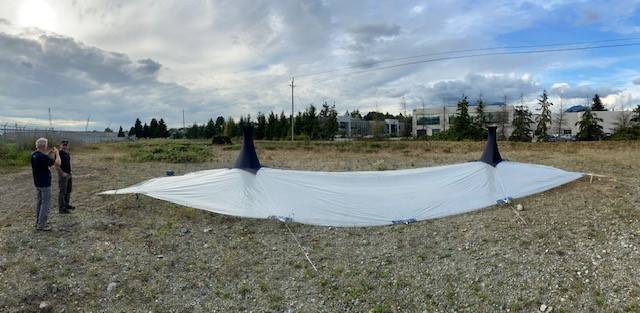
For the People. For the Planet - Today is the International Day of Awareness on Food Loss and Waste Reduction (September 2020)
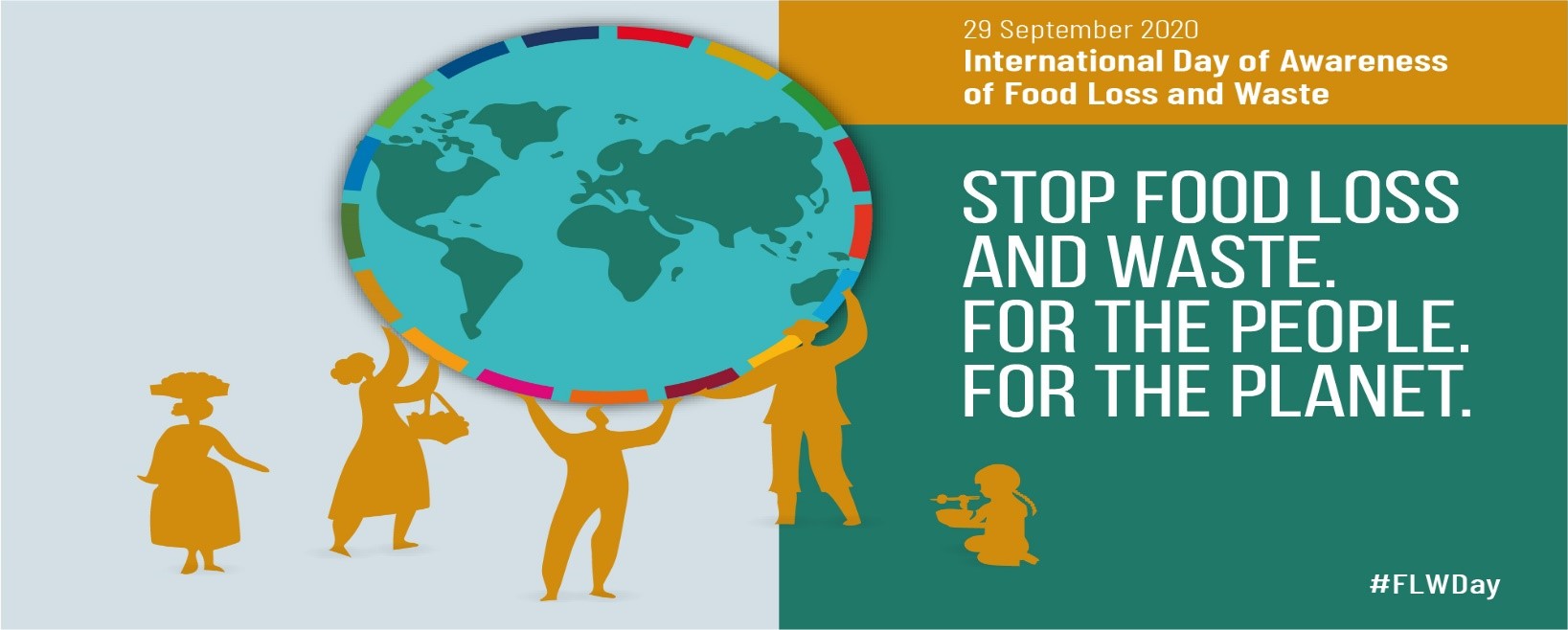
Our program is proud that our partners contribute to the global efforts to reduce post-harvest losses in multiple countries, helping to secure the harvest for improved livelihoods, food security, nutrition and resilience. PHLIL's management entity partnered with the ADM Institute for the Reduction of Postharvest Loss at University of Illinois to write this blog post in honor of the inaugural event. You can read more about the United Nations' reasoning for naming and observing this day by clicking here.
Adapting to COVID-19 - Gender Equity Course Shifts to an Online Format in Ghana (June 2020)
In July and August, Dr. Anna Snider of AgReach at the University of Illinois will be teaching an online class on Assessment of Agricultural Technologies for Gender Equity at the University for Development Studies in Tamale, Ghana. While most technology assessments end at an evaluation of the efficacy of the technology and a cost-benefit analysis, a Gender Technology Assessment considers the differential impacts of technologies on women and men, the equitability in access to the technologies, and the impact on gender roles that result from uptake of the technology. The class, which was originally planned to be an in-person, one-day seminar, will, due to COVID travel restrictions, be taught as a 3-part class via Zoom.
April is Post-Harvest Month on Agrilinks (April 2020)
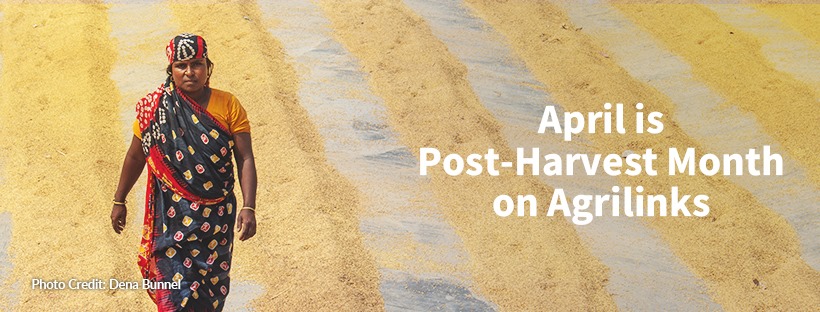
This April is Post-Harvest Month on Agrilinks, and the Post-Harvest Loss Innovation Lab is hosting! Join us as we take an in-depth look at how reducing post-harvest loss creates more resilient communities. Read the opening post from PHLIL Director Jagger Harvey and USAID Senior Nutrition Advisor Ahmed Kablan and check in regularly for many more posts and discussions. The month will culminate with a webinar led by PHLIL on April 30 at 8:30am CT.
In partnership with the Kansas State University Department of Entomology, the Post-Harvest Loss Innovation Lab is hosting Dr. Georgina Bingham, Senior Technical Specialist and Global Partnerships from Vestergaard, to share her seminar titled "New technologies for age old problems, changing the face of small holder post-harvest commodity warehousing" on January 28, 2020 at 4PM in Waters Hall 231. You can find the zoom link to watch the seminar remotely here.
Young Entrepreneur Fights Food Loss with Innovation (August 2019)
Isaac Sesi, a young Ghanaian entrepreneur worked with the Post-Harvest Loss Innovation Lab and Dr. Paul Armstrong, a USDA Agricultural Research Service researcher, to develop the GrainMate moisture meter, which measures the moisture content of maize and other grains. By helping farmers know when their grain is dried and ready for storage. Isaac and his team at Sesi Technologies believe this technology can help many small holder farmers and their families come out of poverty and hunger. (more...)
PHLIL Researchers Hone Lab Skills at K-State Fusarium Workshop
By: Claire Poore
From June 23-28, scientists from all over the world gathered at Kansas State University to participate in the annually-held Fusarium Laboratory Workshop.
For 20 years, Dr. John Leslie (University Distinguished Professor at KSU) and Dr. Brett Summerell (plant pathologist at the Royal Botanic Gardens and Domain Trust in Sydney, Australia, and KSU adjunct professor) have been training scientists on the diverse fungal genus of Fusarium. With nearly 700 participants from over 70 countries, the Fusarium Workshop is a hallmark of international cooperation.
The genus Fusarium is home to a variety of plant and human pathogens. One major concern is mycotoxin contamination, which can have serious impacts on human and animal health. This is an issue on which the KSU-led Feed the Future Innovation Lab for the Reduction of Post-Harvest Loss is working on through a project in Nepal, as well as in other countries.
This year, three key members of the PHLIL-Nepal team participated in the workshop. PHLIL Director, Dr. Jagger Harvey; Dr. Gopal KC, technical lead for PHLIL’s Nepal project; and Immaculate Wanjuki, PHLIL graduate student, spent the week honing their skills in working with Fusarium and mycotoxins.
The skills learned at the Fusarium Workshop will help PHLIL graduate student, Immaculate Wanjuki, accurately identify the Fusarium species that may be producing aflatoxin from 3,000 samples of corn and soil from Nepal. For Dr. KC, the Fusarium Workshop provided hands-on experience and practical skills in identification and mycotoxin detection that he will be able to take back to his students to further work on solving the mycotoxin problems in Nepal. Dr. Harvey is a plant geneticist with extensive experience working on mycotoxins. He is the principal investigator on the Nepal project and PHLIL Director.
PHLIL’s collaborators on the Nepal project include the Nepal Development Research Institute, the Nepal Academy of Science and Technology, Tribhuvan University and the Mars Global Food Safety Center in China. It is funded by the United State Agency for International Development (USAID).
Mycotoxin contamination is a danger throughout the world and especially in developing countries where the food supply faces a number of threats. The Fusarium Workshop serves as a reminder of what can be accomplished when we work together as a global community to further research in growing and protecting our food supplies.
US Ambassador to Bangladesh visits PHLIL Bangladesh (April 2019)
United States Ambassador to Bangladesh Earl R. Miller visited Mymensingh on April 23 to learn more about the Post-Harvest Loss Innovation Lab’s work in Bangladesh, visiting both Bangladesh Agricultural University (BAU) and Bhai Bhai Engineering.
Bhai Bhai Engineering is one of the local engineering workshops that currently produces the BAU-STR dryer, a low-cost charcoal-fired dryer for drying rice and other grains. The BAU-STR dryer was developed by our team of agricultural engineers at BAU. Using a design originally from Vietnam, the BAU team modified the dryer to meet local conditions and be affordable for farmers in Bangladesh. PHLIL partnered with Bhai Bhai Engineering and other local small enterprises to manufacture the core components of the dryer and make it available for sale. Bhai Bhai continues to be supported with technical assistance from PHLIL’s Bangladesh team. In addition, PHLIL recently partnered with a local electronics company to develop a locally-produced version of the blower, a key component to supply forced air for drying, which has allowed the dryer is produced entirely locally and thereby further reduce the cost. The BAU-STR model is a half-ton capacity batch dryer can dry paddy rice in 4 to 5 hours, making the drying process more efficient and almost 30 percent cheaper than traditional sun drying. This collaboration between USAID, universities and the public and private sectors was highlighted during the Ambassador’s visit. This partnership also shows the capacity of Bangladeshi small and medium enterprises to innovate and meet the demand for a growing agricultural mechanization sector. The Bangladesh Department of Ag Extension (DAE) is planning to scale the dryers at farmer field schools throughout the country. Learn more about the BAU-STR dryer here.
Ambassador Miller’s visit also allowed him to learn more about the Bachelor of Science (BS) program in Food Safety Management at BAU, showcasing BAU’s strong partnership with U.S. Government programs.
Nepal Lab Launch at Nepal Academy of Science and Technology
On Friday, November 30, 2018 The Feed the Future Innovation Lab for the Reduction of Post-Harvest loss officially inaugurated the mycotoxin analysis laboratory for food and feed at the Nepal Academy of Science and Technology as part of a stakeholder consultation workshop for mycotoxin mitigation for health, nutrition and agriculture co-hosted with the Nutrition Innovation Lab. Through the PHLIL Mycotoxin Assessment project in Nepal, we are seeking to better understand the sources of mycotoxin 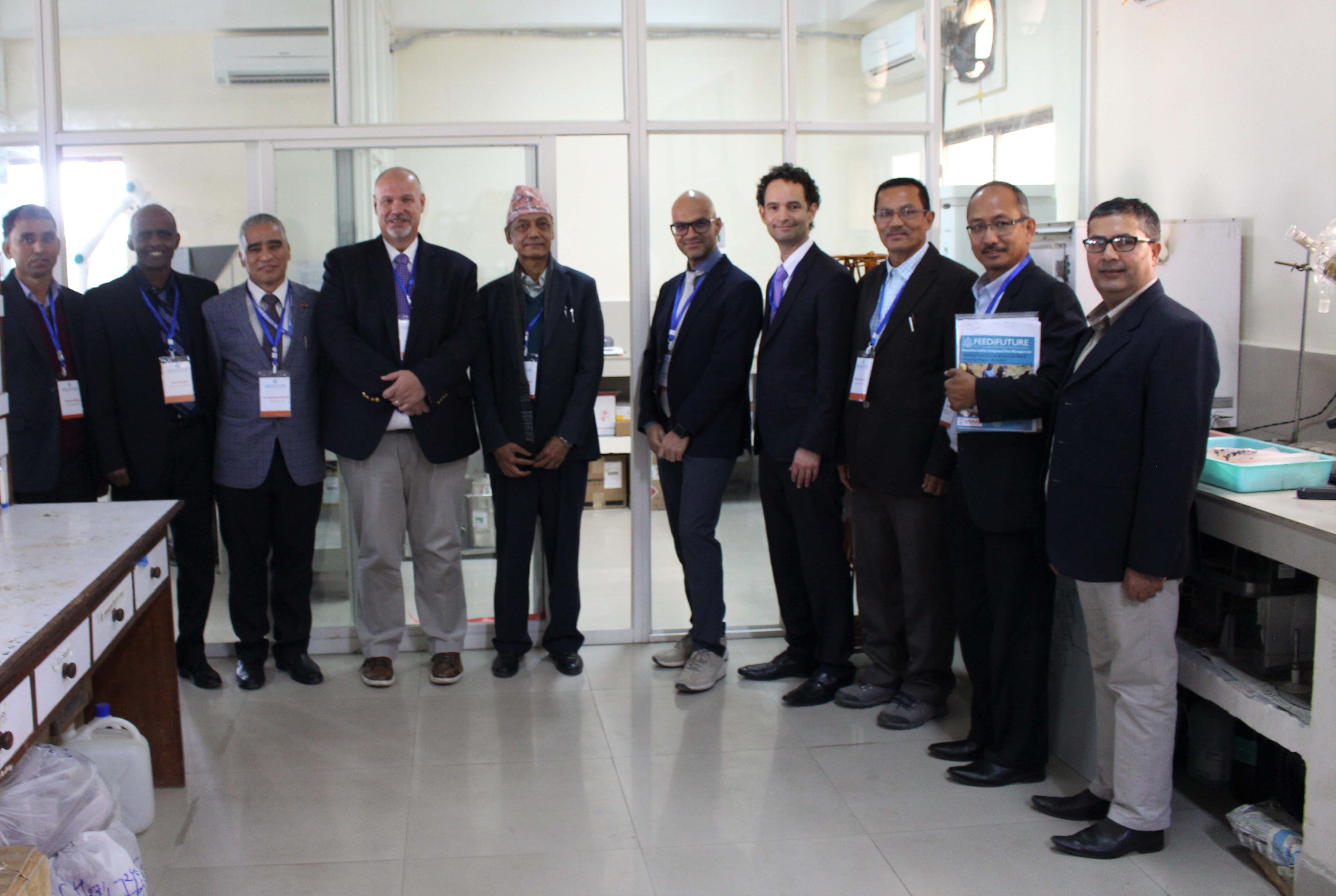 contamination in food and feed and link that to health and nutrition outcomes, especially for mothers and infants, in Nepal. The establishment of the lab has included training of Nepali researchers and equipping the laboratory to be able to conduct mycotoxin analysis in country. We are excited for the human and institutional capacity building this lab represents for Nepal.
contamination in food and feed and link that to health and nutrition outcomes, especially for mothers and infants, in Nepal. The establishment of the lab has included training of Nepali researchers and equipping the laboratory to be able to conduct mycotoxin analysis in country. We are excited for the human and institutional capacity building this lab represents for Nepal.
At the workshop, the team from PHLIL-Bangladesh also presented the BAU-STR dryer as a potential mycotoxin mitigation technology that could be used in Nepal. The Bangladesh team also taught a two-day workshop on the operation and maintenance of the dryers, participants included local stakeholders from industry, government, and non-governmental organizations.
The Lab is part of a larger project funded by the USAID Mission in Nepal. As this project studies mycotoxin exposure and the stunting of children’s development, it is also building national research capacity by empowering the National partners from the Nepal Development Research Institute, Tribhuvan University and the Nepal Academy of Science and Technology (NAST). The mycotoxin analysis laboratory for food and feed at NAST is a collaborative effort across project partners and the Mars Global Food Safety Center in China. The lab is relatively low cost, will serve the Nepali research community broadly, and provides the blueprint to deploy similar labs in other Feed the Future countries and beyond.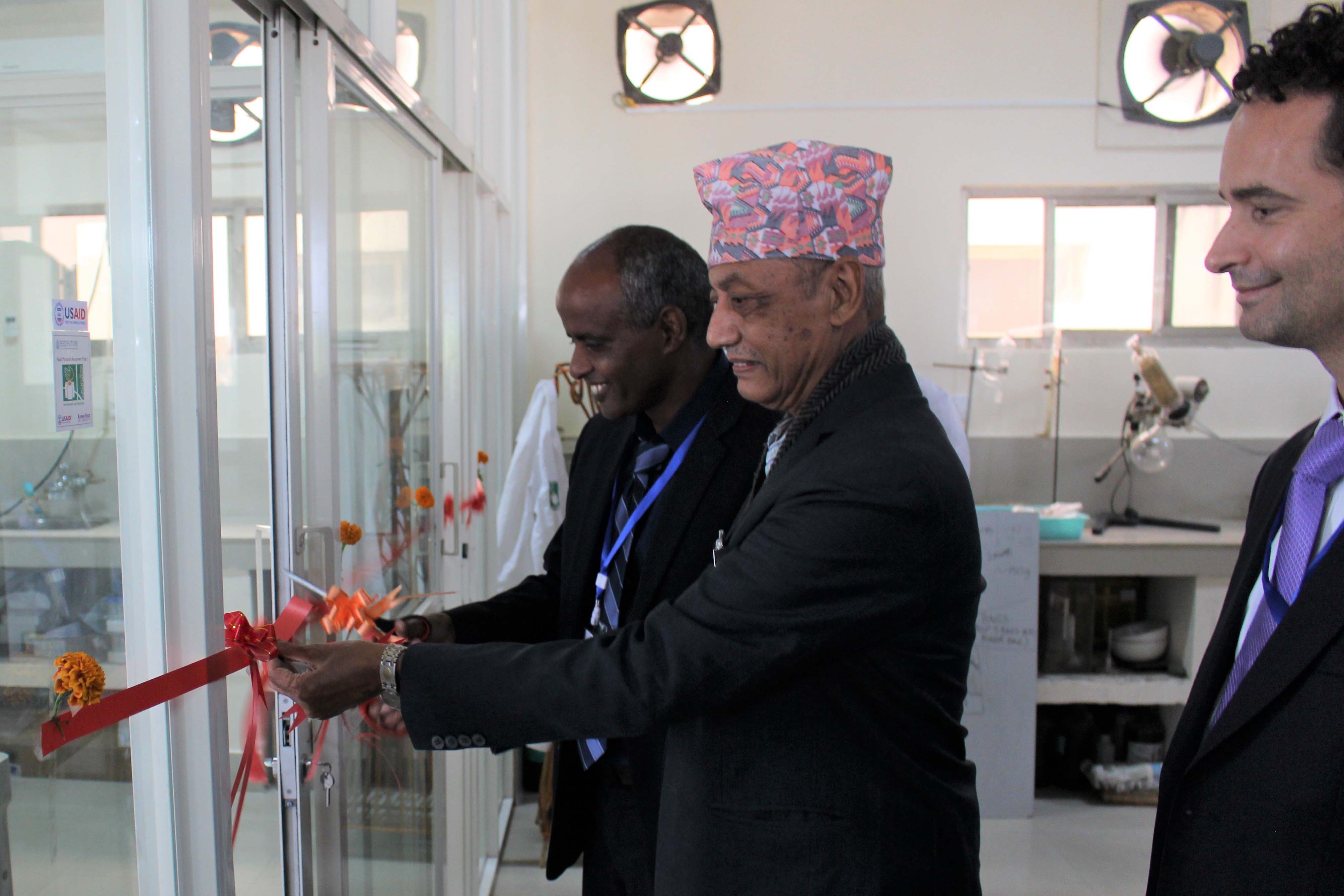
The household survey that is being carried out by Helen Keller International, and will allow the generation of analytical models that relate mycotoxin prevalence with demographic, management and environmental risk factors. Ultimately, we seek to further the development of predictive risk modeling to better understand, track and target interventions for mycotoxin risk globally. The Commonwealth Scientific and Industrial Research Organisation in Australia is leading efforts to synthesize survey data with climatic conditions, to generate maps to help target interventions to chronically at risk, and emerging hotspots of mycotoxin outbreaks. This will be paired with identification of short-, medium- and long-term intervention strategies to reduce mycotoxin exposure in Nepal.
The combination of the national capacity established in Nepal to detect and mitigate mycotoxin exposure with the models that will be informed by the survey’s data will allow for a safer food supply for Nepal’s most vulnerable populations, women and children.
K-State’s Land Grant Mission Highlighted by the Feed the Future Innovation Labs
The Interim Dean of the College of Agriculture and Research and Extension at K-State highlights the work of the Feed the Future Innovation Labs. Dr. Vern Long of USAID is also featured in the video discussing K-State’s broad portfolio of research, education, and service that advance the goals of Feed the Future.
Ethiopian Scholars Research Presentation
Come join us on Wednesday, November 7 in Waters Hall 009 from 12:00 - 2:00 PM to hear from Aynadis Molla, Karta Kalsa, Admasu Worku, and Samuel Lapiso, four PhD candidates from Bahir Dar and Mekelle Universities. Mrs. Molla, Mr. Kalsa, Mr. Worku, and Mr. Lapiso will present their research on drying, storage, and mycotoxins. Mr. Lapiso will present on mycotoxin research. These students have spent the last month at K-State analyzing their data and working on manuscripts for publication, they will share their findings and their progress during this presentation. Anyone is welcome to attend.
PHLIL Receives Three-year Extension from USAID (August 2018)
On August 23, 2018 USAID announced a three year $3 million extension of the Feed the Future Innovation Lab for the Reduction of Post-Harvest Loss. Researchers and staff are excited to have the support of Feed the Future and USAID to continue our mission of reducing post-harvest loss and improving livelihood
Recently Published Report: Science Breakthroughs to Advance Food and Agricultural Research by 2030
The US National Academy of Sciences recently published a report titled “Science Breakthroughs to Advance Food and Agricultural Research by 2030”. This report illuminates the path of transformation for food and agriculture through research over the next decade. With the global population expected to reach 9 billion people by 2050, research in food and agriculture is more important than ever before. Feeding 9 billion in 2050 requires advancements in agricultural production and food safety, which can only be achieved through transformative research. PHLIL Director, Jagger Harvey, was involved as one of the scientists at the Jamboree where scientists conferred on the most pressing research needs. At the Jamboree, thirty-seven researchers worked to articulate high priority research gaps and discussed impactful research opportunities in the food and agriculture space. Former Dean of the College of Agriculture and Director of K-State Research and Extension at Kansas State University, John Floros, served as a co-chair on the committee of scientists, helping to guide the discussion and select the contents of the report. The report provides a roadmap for the research community, including donors, to help propel US food and agriculture into a new era of sophistication, productivity, safety and sustainability.
PHL Moisture Meter Gaining National and Regional Attention in Africa (March 2018)
Africanews recently featured the GrainMate moisture tester, created by Sesi Technologies and PHLIL researchers, to measure the moisture content of grains, helping prevent growth of harmful toxins, and reducing losses by 38%. These young entrepreneurs recently attended the Mobex Africa ICT Expo sharing their message of the power of ICT in agriculture with the Vice President of Ghana. Find out more about Sesi Technologies here.
Engaging Kansas Youth in Global Agriculture
The Kansas Youth Institute of The World Food Prize was hosted by the College of Agriculture at Kansas State University on April 17, 2018. Through this program, students from grades 8-12 are asked to write a short essay about a global challenge in the food system and present on it at a one-day event at KSU. One of this year’s participants, Mahaila Hickman, an eighth grade student at Flint Hills Christian School in Manhattan, Kansas, chose to write about post-harvest losses in Ethiopia. In preparation for the Youth Institute, Mahaila met with Tesfaye Tadesse, a PhD student in the Department of Grain Science at Kansas State University, and a researcher at the Feed the Future Innovation Lab for the Reduction of Post-Harvest Loss. Mahaila wrote her paper about the challenges of post-harvest loss in Ethiopia, and through Tesfaye’s research she learned of the problem of weevil infestation in stored grain and a potential solution. Tesfaye’s research has shown that some inert dusts can provide a non-toxic, carcinogen-free solution to preventing weevil infestation in dried crops. When 0.5 grams of filter-cake, a bi-product of aluminum sulfate production, is applied to a 1kg bag of maize, it kills 100% of the insects by dehydrating them. Mahaila was able to discuss this innovative research with her peers at the Kansas Youth Institute of the World Food Prize and local experts in food and agriculture. Her participation in the institute gave her the opportunity to meet with someone from another culture and to learn about the challenges facing Ethiopia and potential solutions being researched at K-State. Most importantly, Mahaila learned that she can be engaged in international agriculture, even in a small town in Kansas.
Each student participant is required to present research and recommendations on ways to solve key global challenges in a short speech and small group discussions.
Ethiopian Graduate Student finds Safer Way to Store Grain
A feature that was recently published as part of Agrilinks’ Food Safety Month highlights the cutting-edge research that Tesfaye Tadesse is doing on inert dusts for grain storage protection against insects as a PHLIL PhD student at Kansas State University. Tesfaye has also recently been awarded the Outstanding PhD Student Award, the Anheuser-Busch Fellowship, and the Kansas State University 2018 Extraordinary Student Award.
Dates set for the 2018 Annual Meeting
The dates have been set for the 2018 Feed the Future Innovation Lab for the Reduction of Post-Harvest Loss Annual Meeting, which will take place at the University of Illinois at Urbana-Champaign this year.
Post-Harvest Loss Innovation Lab and KNUST Launch Locally Produced Tool to Reduce Post-Harvest Loss in Ghana (November 2017)
On November 16, 2017, the U.S. Government’s Feed the Future Innovation Lab for the Reduction of Post-Harvest Loss (PHLIL), funded by the U.S. Agency for International Development, and the Kwame Nkrumah University of Science and Technology (KNUST) launched the Ghana-based production of a low-cost moisture testing meter used to reduce post-harvest losses (PHL) in maize in central and northern Ghana.
Milling Journal features Post-Harvest Loss Innovation Lab
The Post-Harvest Loss Innovation Lab was featured in the Second Quarter issue of the Milling Journal. In a Q&A with PHLIL Director Jagger Harvey, the journal covers the history and mission of the lab, the current situation with post-harvest losses, and the lab’s positive impact in the grain and milling industry abroad and in North America.
Post-Harvest Loss Innovation mentioned in Nature editorial (April 2017)
The Post-Harvest Loss Innovation Lab was provided as an example of Feed the Future and USAID's effective approach to applied research for development in a recent editorial in the online news section of Nature, the international weekly journal of science. The piece highlighted the BAU-STR dryer being scaled by the PHLIL-Bangladesh team at Bangladesh Agricultural University as a technology that is both scientifically sound and in demand by local farmers. A follow-on article in K-State Today further expanded on our efforts in Bangladesh.
January 2017 PHLIL Newsletter - Focus on Ethiopia
Check out PHLIL's newest newsletter for a snapshot of our activities in Ethiopia. The newsletter kicks off a series that will highlight each of our focus countries.
BIFAD Chair Dr. Brady Deaton talks about K-State's Innovation Labs
Dr. Brady Deaton, Chair of the Board for International Food and Development, talks to Agriculture Today on the K-State Radio Network about the Feed the Future Innovations Labs at K-state and their impact on global food security during his recent visit to K-State.
K-State 2025 Spotlights: Feed the Future Innovation Labs
K-State 2025 highlights the K-State Feed the Future Innovation Labs and their role in achieving the K-State 2025 vision and improving global food security.
K-State welcomes new PHLIL Director (February 2016)
Dr. Jagger Harvey has been appointed as the new PHLIL director starting May 16, 2016.
U.S. Borlaug Fellows in Global Food Security Program
U.S. Borlaug Graduate Research Grant is calling for application, deadline April 11, 2016.
ACE II Eastern and Southern Africa Higher Education Center of Excellence Project (December 2015)
Announcement of conditionally selected eastern and southern Africa higher education center of excellence.
Immana Fellowship Call for Applications and Informational Webinar
Horticulture Innovation Lab is Calling for Proposal
NEW RFP: CALL FOR TRELLIS PROJECT PROPOSALS The Horticulture Innovation Lab is seeking proposals from organizations in developing countries for small horticultural projects, through its Trellis Fund.
Research Opportunities from USAID for Feed the Future Developing Local Extension Capacity
The United States Agency for International Development (USAID), Bureau for Food Security, Office of Country Strategy Implementation, is seeking applications for a Cooperative Agreement for the implementation of the Feed the Future Developing Local Extension Capacity project specifically described in Section A of the RFA.
Research Opportunities from USAID for Agricultural Topics Under Mission Forecast and Washington Forecast
More details and anticipated dates for RFA issue (typically between now and end of December 2015) are included in the attached files. The award amounts vary from $9 to $50 million and contracts are for 5 years. Contact Dr. Nina Lilja (nlilja@ksu.edu) for more details.
Upcoming NC-213 Annual Meeting at Austin, TX (March 1-2, 2016)
NC-213 is a project team of engineers, scientists, and economists from leading U.S. land grant universities and government research centers that conduct research to create and disseminate the technical knowledge needed to manage quality food safety and bio-security efficiently in world grain.
Agriculture for Impact (October 2015)
Growing opportunities for Africa
The Deere Foundation Donates $10,000 For Moisture Readers to K-State University Feed the Future Innovation Lab For Reduction of Post-Harvest Loss (November 2014)
The Deere Foundation made the donate for the purchase of 40 moisture meters to be used in the four focus countries on the project.
From Better Seeds to Beneficial insects, K-State Researchers Fight World Hunger (November 2014)
The federal government has invested $100 million in Kansas State University scientists for role in fighting global hunger.
Romer Labs Makes a Generous Donation (November 2014)
Romer Labs donates mycotoxin test strips and readers to the PHL lab.
Food Waste in America (September 2014)
Food waste is the single-largest source of waste in municipal landfills. According to the EPA, 35 million tons of food were thrown away in 2012.
Post-Harvest Innovation Lab cited in Food Waste in America Special Report (September 2014)
Food waste at the production level may not be a major issue in the US but according to a UN report, in developing countries, more than 40% of food waste happens on the farm or during production.
USAID Africa Food Security Partnership Update (August 2014)
Africa has witnessed remarkable change in the space of one generation. The 2014 US-Africa Leaders Summit is a historic opportunity to deepen our engagement.
Romer Labs Collaborates with Feed the Future Initiative in International Program to Reduce Post-Harvest Loss and Food Waste (July 2014)
Interventions under this project will integrate smallholder farmers, producer cooperatives, and agribusiness enterprises with market-based value chains.
Kansas Idea Feeds 3 Billion (July 2014)
More than 60 years after it was first drafted in the small town of St. Francis, Kansas, Food for Peace has been credited with saving over 3 billion lives.
SC State researcher part of global leadership to ensure food security from post-harvest loss (July 2014)
To help address the fight against global hunger, researchers in the United States and abroad have teamed up to establish the Feed the Future Innovation Lab for the Reduction of Post-Harvest Losses.
IRRI-Bangladesh Gets the Ball Rolling on New Project for Reducing Post-harvest Losses (June 2014)
The 5-year project is funded by the USAID, under the Feed the Future initiative, and will be implemented by IRRI-Bangladesh with support from Kansas State University and the University of Illinois.
K-State Feed the Future PHL Innovation Lab Receives USDA Award to Study Use of Metal Silos in Guatemala (June 2014)
This Project fits with the PHL Innovation Lab overall objectives because its main goal is to improve storage conditions of corn harvested in the highlands of Guatemala by introducing improved post-harvest technologies, i.e. metal silos.
CSISA and FtF Innovations Lab Join Hands in Bangladesh for Promoting Drying Technology (April 2014)
The stakeholder workshop sought to test and demonstrate newly piloted flat bed drying technology with village millers and other stakeholders for drying of high- moisture freshly parboiled paddy- a new application under evaluation in Bangladesh.
